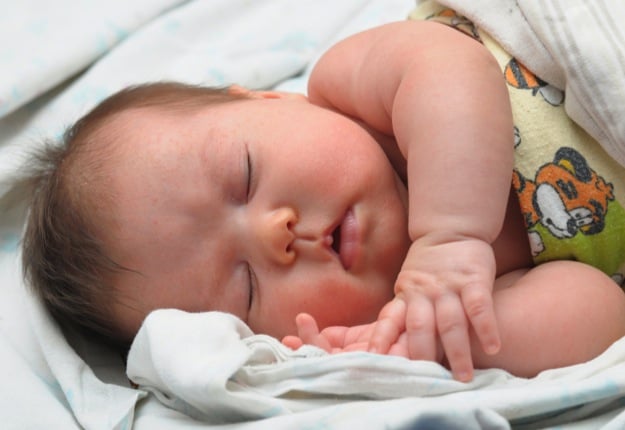I had just been through the most difficult three months of my life. In and out of hospital with my baby boy who had pneumonia, a urinary tract infection and reflux.
I finally felt as if I was getting it all together and about start enjoying my newborn when a rash kept persisting on his cheeks.
At first I didn’t want to overreact and I was so exhausted from everything else that had happened the previous months that I ignored it. Plus I told myself rashes tend to come and go all the time with babies…right?
Looking back on photos now, I can’t believe I thought this rash might just go away.
The rashes persisted and there were more coming up in the creases of his elbows, behind his knees and on his scalp. I also noticed that he kept rubbing his face against me to scratch. I finally acknowledged that it was time to have these rashes seen by a doctor. Diagnosis…eczema.
Here are some signs and symptoms that your baby might have eczema:
1) The age when eczema usually appears
Eczema is not usually present at birth, but tends to show itself within the first year of life. Six weeks to three months seems to be a common time for the eczema to appear. It almost always develops within the first five years.
2) What eczema can look like
The look of the rash can be different between children, and sometimes with my toddler I have noticed his eczema can look different depending on where it is on his body.
Generally the rash will be scaly and dry and sometimes have little red little bumps. Some rashes come and go, but eczema that isn’t managed persists.
3) Eczema is very itchy
The rash is very, very itchy. Your toddler’s skin can easily become damaged and infected from all the scratching and rubbing which he is not able to control.
4) Where is eczema on the body?
The rash usually starts on the face, scalp or the elbows and knees. These places are easier to scratch or rub. As your baby gets older behind the ears is a common place, but eczema can appear anywhere on the body.
5) Eczema in the family
Like with any medical concern it’s important to know your toddler’s family history. There is a genetic link with eczema. Also a diagnosis of eczema is even more common if any family members suffer from asthma or hayfever.
If you think your baby might be showing signs of eczema it’s important you see your doctor so you can start an eczema management routine.
Do any of your children suffer from eczema? How do you manage it for them? Please share in the comments below.





















10:44 am
2:43 pm
10:14 am
10:40 pm
-

-
-
mom94125 replied
- 17 Oct 2015 , 3:26 pm
Reply6:26 pm
12:56 am
-

-
-
juliasimmonds_itchybabyco replied
- 02 Oct 2015 , 9:49 pm
-

-
-
mom122183 replied
- 03 Oct 2015 , 12:42 pm
-

-
-
mom94125 replied
- 15 Oct 2015 , 1:32 pm
Reply7:27 pm
-

-
-
juliasimmonds_itchybabyco replied
- 02 Oct 2015 , 9:51 pm
Reply10:23 pm
9:48 pm
5:44 pm
1:50 pm
7:49 am
9:41 pm
-

-
-
juliasimmonds_itchybabyco replied
- 08 Sep 2015 , 1:45 pm
-

-
-
dannsbuild replied
- 09 Sep 2015 , 9:33 pm
Reply8:07 pm
-

-
-
juliasimmonds_itchybabyco replied
- 08 Sep 2015 , 1:43 pm
Reply10:15 pm
-

-
-
juliasimmonds_itchybabyco replied
- 08 Sep 2015 , 1:43 pm
Reply5:18 pm
-

-
-
juliasimmonds_itchybabyco replied
- 08 Sep 2015 , 1:41 pm
Reply12:17 pm
-

-
-
juliasimmonds_itchybabyco replied
- 08 Sep 2015 , 1:30 pm
Reply7:41 am
-

-
-
juliasimmonds_itchybabyco replied
- 29 Aug 2015 , 11:25 am
Reply9:06 pm
-

-
-
juliasimmonds_itchybabyco replied
- 29 Aug 2015 , 11:28 am
Reply10:35 am
-

-
-
juliasimmonds_itchybabyco replied
- 29 Aug 2015 , 11:29 am
Reply- 1
- 2
- 3
- »
Post a commentTo post a review/comment please join us or login so we can allocate your points.